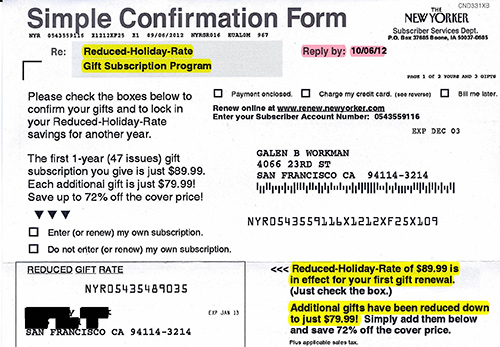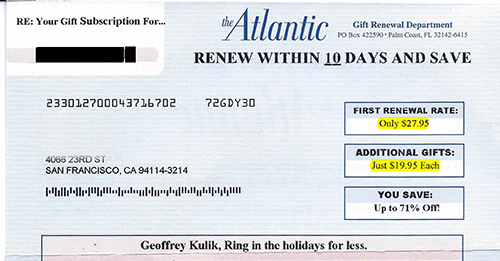Beware of False Urgency and Special [High] Rates
Planting a sense of urgency in your potential customer’s mind so they make a decision and buy is a time-honored sales tactic. It works!
Proclaiming specials and offering discounts off the list prices are time-honored tactics, too. They work!
Combining urgency with specials, magnifies the potency of a sales campaign. Think of all the holiday weekend specials, introductory pricing, and special low-prices sales “events” you hear and see.
Unfortunately, today’s sophisticated pricing tools allow businesses you already patronize to use limited-time specials on goods and services you’re familiar with to rip you off. Far more insidious than the deals for “new customers only,” today’s pitches tell you that you’re getting a great price, when, in fact, you are paying more than anyone else.
Here’s an example. The New Yorker sent me a limited-time magazine gift renewal recently.
The New Yorker is offering a “Reduced-Holiday-Rate (sic) of $89.99″, and I had only until October 6 to sign up. This is a perfect example of a large, savvy company creating a untrue sense of urgency and offering an expensive special.
The New Yorker wants me to renew my gift subscription for $89.99. But, if I just went to their website, I could buy the same 47-issue gift for $39.95.
Basically, this offer charges loyal repeat customers 225% what people wandering by on the Internet can pay at the same time it touts the price as something special. (If you want to renew an existing gift, you can call the number of the back of the renewal form and get a price of $49.99 a year, if you mention the Internet price.)
Actually, the magazine has a maze of different prices for the same product, depending upon how interested you seem to be. If you click on “Subscribe” on their home page, you’re offered a third price, $69.99, as the BEST DEAL. I think they’ve crossed the line into legally questionable claims with “Best Deal”, but I am no lawyer.
The New Yorker is not alone in charging its current customers more while trying to make it seem like they are offering a deal.
The Atlantic magazine also offers existing givers of subscriptions the chance to overpay… but only if they act quickly!
To renew existing gift subscriptions, you “save” by paying $27.95. Of course, their website offers new subscriptions for $14.95. The Atlantic website also offers you a chance to give a subscription for $24.95. As far as I could see, you couldn’t pay more than 27.95, despite the ad’s come on to “Ring in the holidays for less.”
Magazines are not the only industry eager to take advantage of their best customers. Intuit was ready to charge me more for the latest version of its Quicken product when I clicked on an in-program upgrade link than it did when I went to the website directly. And, every year I have to talk to my satellite TV provider and cable Internet companies as they attempt to raise my rates higher than those they quote the public.
I understand promotions meant to attract new clients. I am fine with offers such as “10% off the first year for new clients only”. But, I don’t like businesses preying on their existing customer base, charging them substantially more, while claiming to provide an especially great price. I’ll play the business’ game, but I hope they don’t expect me to feel loyal or supportive toward them.


